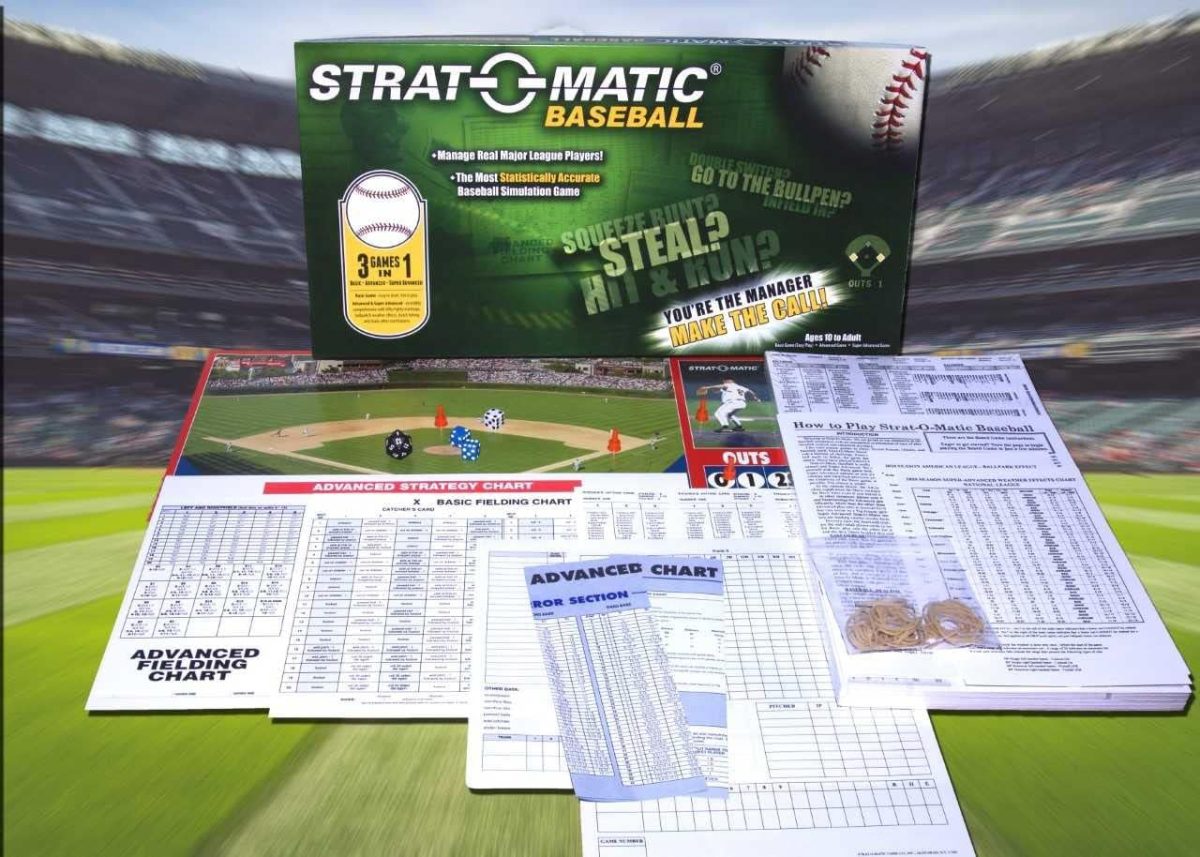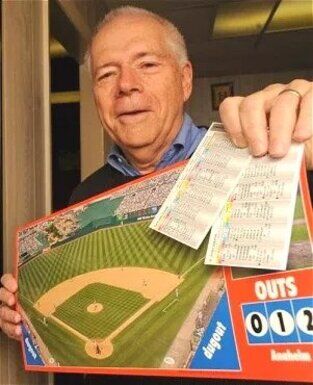A roll of the dice lead to lasting friendships
A baseball game can be won with one swing of the bat.
To win in the most popular baseball tabletop games it can take one roll of the dice.
That suggests, it’s about luck. But Strat-O-Matic, APBA and other tabletop baseball games can be so much more.
APBA was founded in Lancaster in 1951 by the late J. Richard Seitz, a trucking firm purchaser. APBA stands for American Professional Baseball Association, the name of a board game Seitz devised in 1931 with eight high school classmates. He formed APBA Game Co., working out of his living room. After 60 years, in 2011, company headquarters moved to Alpharetta, Ga.
The company’s first product was a baseball simulation game using cards to represent each major-league player, boards to represent on-base scenarios and dice to generate random numbers. The game can be played against another person or solitaire.
The game company later produced football, golf, basketball, hockey, bowling, boxing, soccer and a saddle racing game modeled after the baseball game (cards, boards, and dice). In the 1980s and 1990s, computer adaptations of some of these games were produced.
Ryan Briggs, sports information director at Grove City College, is an exclusively solitaire APBA baseball player. He compiles statistics in leagues he has put together, series’ and entire seasons.
The game captivates him and allows him to pit teams from different decades and eras against one another.
“I bought my first game at a toy store or at the outlet mall in 1996,” Briggs said. “My original set was the four teams in the league championship series in 1995.”
John Perrotto, longtime writer for the Beaver County Times and a beat writer covering the Pirates and major league baseball for various publications for more than 30 years, is also an APBA fan.
“It’s the (tabletop baseball game) I grew up with,” Perrotto said. “I have always enjoyed it and found it fascinating to manage a big-league team.”
Perrotto played in leagues by mail and has remained loyal to APBA despite not playing games much anymore because of workload and life responsibilities.
“We used to play some games on the computer in the pressbox before (Pirates) games,” Perrotto said. “It’s fun and the statistical information – the foundation of the game – is based on the actual MLB performance of all the players.”
“I enjoy games and baseball,” Briggs said. “The combination intrigued me. I sort of came across it accidently. I decided to play and I was hooked.”
Strat-O fanatics
Those who love baseball, strategy and being the boss are most attracted to the game.
“From the time I was a kid, baseball was always my favorite sport,” said Joe Campinelli, a business manager in a West Virginia school district. “I used to play what I called “dice baseball” with two dice and rolled them and would set up games on my own with the outcomes from the dice rolls.
“I originally was interested in APBA, and when I went to West Liberty College (in the 1980s), I was introduced to Strat-O-Matic. It just seemed like it was a much easier game to play and less confusing, more straightforward. I remained interested in it because I love the strategy portion of it. I love the whole thought process and everything behind it.”
Strat-O-Matic, headquartered in Glen Head, N.Y., develops and produces sports simulation games. Its most popular game is baseball. It also offers football, basketball and hockey. It also produces computer versions of each.
Strat-O-Matic became a company in 1961, when Hal Richman, a mathematics student at Bucknell University, began selling an early version of his baseball tabletop game out of his basement. He purchased advertising space in Sports Illustrated to help increase sales.
Richman released an “advanced” baseball game in 1972. Strat-O-Matic’s statistical research and game development methods are implemented with the intent of replicating players’ abilities as accurately as possible.
Frank Rotunda, a retired principal and wrestling coach, collected baseball cards as a youth and devised his own dice games for baseball, football, basketball, hockey and even wrestling.
Strat-O-Matic, however, stole his heart.
“I was at a softball tournament and saw some guys playing this game (SOM) and thought, “this is better than our dice baseball game.”
Some of those guys and other friends formed a league, playing a 162-game schedule and playoffs. That association led to new friendships and some crazy times.
Liftime of play
SOM baseball cards are usually available in February each year.
“We used to follow UPS trucks around trying to find out if they had our Strat-O cards on the truck,” Rotunda said.
Rotunda and another friend once funded a trip for two other players in their league to travel to Glen Head to get the pre-ordered cards on what SOM now calls “Opening Day.”
“You couldn’t track shipments then and there were no cell phones,” Rotunda explained. “There wasn’t instant information available then like today. There wasn’t a baseball channel. We subscribed to Sporting News to review box scores and all statistical data the cards are based on.
“We used individual teams and you started following them. You wanted to know what they were doing in games because it would impact what kind of cards they were going to have the next year. I used the St. Louis Cardinals and became a Cardinals fan. I was on a job one night and in between, I would run out to the car to listen to the Cardinals game on (KMOX) radio.”
Another league member followed the Toronto Blue Jays. He would drive his car at night to the depths of Washington County, places where he could pick up the Toronto games on radio. He once found himself surrounded by cows and other animals on a side road in Avella trying to catch the end of a Blue Jays game in late September during a pennant chase.
“We did anything to get information,” Rotunda laughed. “Anything.”
Dan Alderson, a teacher in the Chartiers-Houston School District, former Bucs baseball coach and current assistant softball coach, said he also learned of SOM by accident.
“I started playing with my brothers at home,” Alderson said. “Around the age of 12, I became part of a league with a group of friends and we continued playing through our college years.
“I think being able to manage a team and make coaching and GM-type decisions is what attracted me and kept me playing. I always knew I wanted to coach and this was a big part in helping me understand the intricacies of the game as a player and coach. Many times, players would be heated in the microwave, left in the freezer, or there were even people trying to steal a card and hide it when a player was hot or in a slump.”
George Walz, a retiree who is a football coach, said the fun was competing against friends and putting together teams.
“We were always playing some kind of ball,” he said. “Strat-O was great fun and great competition among friends.”
Paul Barone, a native New Yorker and Virginia resident, is a retired structural engineer. He started playing SOM in 1975 with his friend. Nearly 50 years ago, the two were the only ones in line to receive their cards at headquarters. Now, it’s practically a holiday.
He has developed a business – by accident – as he creates custom scorebooks, dice mats, dice shaking cups, dice towers and dice trays.
“I didn’t plan it,” Barone said. “My friend Mark suggested I put it on Facebook just to see. It’s blown up into a business. It’s extra money and keeps me busy.”
For players of either game it is a life-long interest, if not a lifetime of playing.
“It’s the camaraderie that you develop with all the guys, how you learn all their techniques and strategies that could make you not only a better player but a better baseball fan,” Campinelli said. “A lot of the guys were the first ones that turned me on to on-base percentage (OBP), which is now a vital statistic to the game as opposed to batting average.
“You develop friendships over the years with these people that you probably never would’ve met or had an opportunity to get to know if it hadn’t been for the game bringing everybody together. It was always a fun time when I would go (to Pennsylvania) on the weekends and would go to three or four guys’ houses and play all your games for the two-week period. We’d order pizza and sit and talk and get to know each other. They’re some of the best friendships that I have made.”



